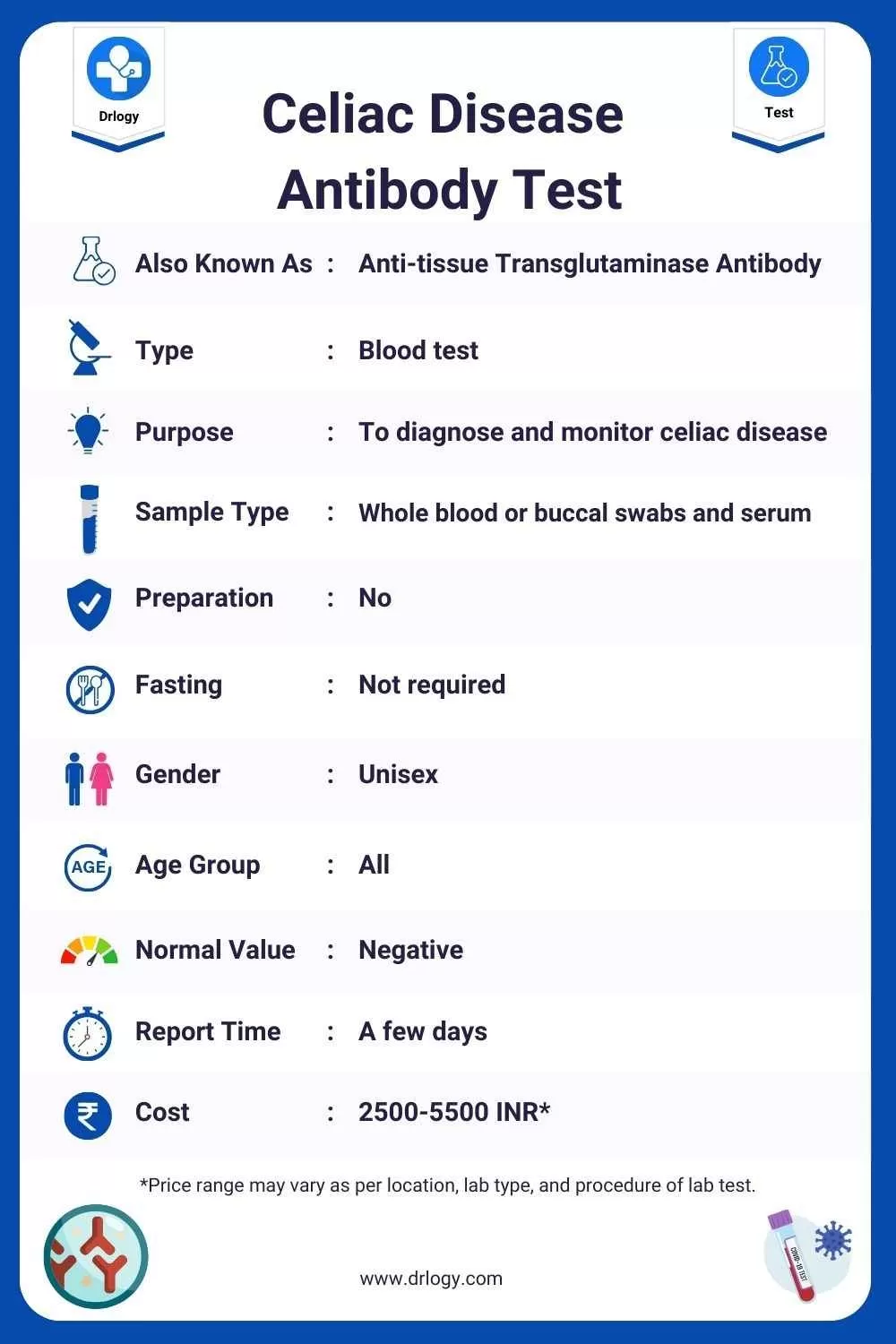
The Celiac Disease Antibody Test is a blood test used to check for gluten sensitivity and celiac disease. It helps diagnose and monitor these conditions by measuring specific antibodies in the blood.
If you have symptoms like abdominal pain or digestive issues, this test can provide important information about your health. It's a valuable tool in understanding how your body reacts to gluten.
Here are the basic details of the Celiac Disease Antibody Test.
| Also Known As | Anti-tissue Transglutaminase Antibody, tTG |
| Type | Blood test |
| Purpose | To diagnose and monitor celiac disease |
| Sample Type | Whole blood or buccal swabs and serum |
| Preparation | No |
| Fasting | Not required |
| Gender | Unisex |
| Age Group | All |
| Normal Value | Negative |
| Reporting Time | A few days |
| Cost | 2500-5500 INR* |
*Price range may vary as per location, lab type, and procedure of lab test.
Celiac Disease Antibody Test is a blood test to diagnose and monitor gluten-related conditions.
The purpose of the Celiac Disease Antibody Test is to:

Here is the basic preparation for the Celiac Disease Antibody Test.
Here is the basic Celiac Disease Antibody Test Procedure.
Here is the normal range of the Celiac Disease Antibody Test.
| Antibody Tested | Normal Result |
|---|---|
| tTG, IgA | Negative |
| Total IgA | Negative |
| tTG, IgG | Negative |
| DGP, IgA | Negative |
| DGP, IgG | Negative |
Here is the Interpretation of the Celiac Disease Antibody Test.
| tTG, IgA | Total IgA | tTG, IgG | DGP, IgA | DGP, IgG | Diagnosis |
|---|---|---|---|---|---|
| Positive | Normal | Not performed | Not performed | Not performed | Presumptive celiac disease |
| Negative | Normal | Negative | Negative | Negative | Symptoms not likely due to celiac disease |
| Negative | Low | Positive | Negative | Positive | Possible celiac disease (IgA deficiency) |
| Negative | Normal | Negative | Positive | Positive | Possible celiac disease (children under 3) |
Celiac Disease Antibody Test results vary, aiding in the diagnosis and evaluation of celiac disease and gluten sensitivity.
Here are the potential causes of Celiac Disease Antibody Test Positive Results.
| Possible Causes | Description |
|---|---|
| Celiac Disease (Confirmed Diagnosis) | Presence of celiac disease antibodies. |
| Gluten Sensitivity | May indicate sensitivity to gluten. |
| Autoimmune Disorders | Elevated antibodies due to other autoimmune conditions. |
| Non-Celiac Autoimmune Enteropathy (NCAE) | Autoimmune intestinal disorders unrelated to celiac disease. |
A positive result can be due to various factors, and further evaluation is often necessary to determine the exact cause.
Here are the potential causes of Celiac Disease Antibody Test negative Results.
| Possible Causes | Description |
|---|---|
| Absence of Celiac Disease | Test result does not show celiac disease antibodies. |
| Incomplete Gluten Exposure | Negative result when gluten was not consumed before testing. |
| IgA Deficiency | Low IgA levels may lead to false negatives in IgA-based tests. |
| Early Stages of Celiac | Negative result in the early stages of celiac disease. |
| Other Health Conditions | Negative results due to unrelated health conditions. |
A negative result can be due to various factors, including early disease stages or insufficient gluten exposure before testing.
Here are the specimen requirements for the Celiac Disease Antibody Test.
|
Specimen |
Whole blood or buccal swabs and serum |
|
|
Volume |
7 mL of blood or four buccal swabs and 3 mL serum |
|
|
Container |
Lavender-top (EDTA) tube or four buccal swabs in a sealed envelope and gel-barrier tube. |
|
|
Collection |
Specimen should be collected to perform reflex assays if criteria is met. |
|
|
Storage |
Room temperature |
|
|
Sample Stability |
Temperature |
Period |
|
Room temperature |
EDTA blood and serum: 14 days; Buccal swab: 1 year |
|
|
Refrigerated |
EDTA blood: 1 month; Serum: 14 days |
|
|
Frozen |
14 days |
|
|
Freeze/thaw cycles |
Stable x3 |
|
|
Causes for Rejection |
Incorrect sample type; lack of proper patient identification on the tube; Serum: hemolysis, lipemia, gross bacterial contamination |
|
Here is the basic limitation of Celiac Disease Antibody Test.
Here are some of the risk factors of the Celiac Disease Antibody Test.
Here are the Doctor's recommendations or consult a specialist after the Celiac Disease Antibody Test.
| Test Result | Doctor to Visit | Reason |
|---|---|---|
| Positive | Gastroenterologist | Confirm and manage celiac disease. |
| Negative | Discuss with GP | Explore other potential causes. |
Here are the estimated Celiac Disease Antibody Test Prices in India with different top cities:
|
City |
Price Range (INR)* |
|
2500-5500 |
|
|
2600-5200 |
|
|
2500-5500 |
|
|
2600-5200 |
|
|
2500-5500 |
|
|
2600-5200 |
|
|
2500-5500 |
|
|
2600-5200 |
|
|
2600-5200 |
|
|
2500-5500 |
|
|
2600-5200 |
|
|
2500-5500 |
|
|
2600-5200 |
|
|
2500-5500 |
*Prices are approximate and vary depending on a specific laboratory or healthcare facility.
Summary
Overall, The Celiac Disease Antibody Test aids in diagnosing celiac disease, detecting gluten sensitivity, and guiding treatment decisions through blood-based antibody assessment. Also check Drlogy Test for detailed information about all medical tests for patients, doctors, scholers and medical students.
Reference
DOCTOR'S MOST TRUSTED HEALTHCARE PLATFORM
10M+Patients
30000+Doctors
25000+Hospitals/Labs